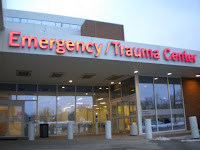June 25th, 2011 by Michael Kirsch, M.D. in Opinion
No Comments »

 I received a call recently from an emergency room (ER) physician about a patient who presented there with rectal bleeding. Does this sound blogworthy? Hardly. We gastro physicians get this call routinely. Here’s the twist. The emergency room physician presented the case and recommended that the patient be discharged home. He was calling me to verify that our office would provide this patient with an office appointment in the near term, which we would. We had an actual dialogue.
I received a call recently from an emergency room (ER) physician about a patient who presented there with rectal bleeding. Does this sound blogworthy? Hardly. We gastro physicians get this call routinely. Here’s the twist. The emergency room physician presented the case and recommended that the patient be discharged home. He was calling me to verify that our office would provide this patient with an office appointment in the near term, which we would. We had an actual dialogue.
This was a refreshing experience since the typical emergency room conversation of a rectal bleeder ends differently. Here’s what usually occurs. We are contacted and are notified that the patient has been admitted to the hospital and our in-patient consultative services are being requested. In other words, we are not called to discuss whether hospitalization is necessary, but are simply being informed that a decision has already been made.
There is a tension between emergency room physicians and the rest of us over what constitutes a reasonable threshold to hospitalize a patient. I have found that many ER docs pull the hospitalization trigger a little faster than I do. What’s my explanation for this? Here are some possibilities. Read more »
*This blog post was originally published at MD Whistleblower*
June 20th, 2011 by DrWes in True Stories
No Comments »

Easy case.
Seen it a hundred times.
Old guy (or gal).
Comes into ER.
Found “down.”
“Hey doc, looks like his hearts goin’ slow. I think he (or she) needs a pacer.”
“On any meds that might do this?”
“Nah.”
“How’s his (her) potassium?”
“4.3, normal.”
And like lots of times, you head in. Glad you can help. Call-team’s on their way, thanks to you. Called the device rep to make sure they can be there just in case, too. Cool as a cucumber. Nothin’ to it. Been here, done this.
You arrive to a guy (or gal) that looks pretty good. Maybe has one or two medical problems. Heart rate’s better thanks to the atropine and the fluids they gave him (her) on arrival. The intraosseus line in the tibia is impressive, too. (“At least he (she) wasn’t awake when that happened,” you think.)
So you review, examine, plan your approach. EKG on presentation? Ouch, heart rate agonal. Wide complex rhythm of right bundle branch rhythm. Look at the monitor: “lots more right bundle branch rhythm there, thank goodness, P waves, too.” you secretely notice.
Seems he (or she) is willing (how many times does he (or she) want to pass out at home?), understands what lies ahead, that the crew’s on their way. “We’ll be taking you over in just a few minutes. Any other questions?” There are none.
Perfect.
And after a while the crew arrives, assembles the poor guy (or gal) on the table and ships him (or her) over to the cath lab area. Chest is prepped, equipment assembled, antibiotics given, monitors connected…
… damn we’re good. Smooth operators.
So the local anesthetic is injected and the incisions made. Dissection to the pre-pectoralis fascia just above the breast muscle accomplished, even the wires passed easily into the vein using ultrasound guidance. Even having a nice chat with the guy (or gal).
Poetry in motion.
Sheaths placed in the vein over the guidewire, pacing leads placed through the sheath. Until, from the control room… Read more »
*This blog post was originally published at Dr. Wes*
May 15th, 2011 by Emergiblog in True Stories
No Comments »

Right now, I have the perfect ER job. So, admitting that I can no longer physically handle working night shift or thinking that I have reached the end of my career in emergency nursing feels like failure.
But, I need to take care of myself, right?
So it’s time to be proactive and take the next step, right?
Time to take a breath, take stock of my skills, brush up that CV/resume and go forward! After all, I have 32 years of strong nursing experience behind me (including a stint as a shift charge nurse), that wonderful BSN I’m so proud of (and an MSN program pending), stunning communication skills (if I say so myself) and gosh darn it, anyone would be lucky to have me!
Yes?
Uh, no.
*****
I applied for jobs outside of acute care.
You know how new grads can’t find jobs because they all want experience, but they can’t get experience because they can’t get jobs? Read more »
*This blog post was originally published at Emergiblog*
March 19th, 2011 by Happy Hospitalist in Humor, True Stories
No Comments »

Every day I go to the emergency room to admit my adults, I can hear the screaming babies and toddlers. Sometimes, the screams are actually from their parents after realizing how much their visit is going to cost. But most of the time it’s really frightened kids in an unfamiliar environment.
Happy’s hospital used to hand out hospital stickers so kids would associate emergency rooms with a fun place to hang out. It turns out, after intense behind the scenes discussions with administration, that this policy was a covert attempt to increase the volume of our pediatric emergency room volumes.
After looking at the numbers, and understanding how hospitals get paid,I have now come on board and am part of a committee think tank that does nothing more than think of ways to get more people through the doors. We invited the intelligence behind the 50% rise in pediatric ICU volumes after implementing the pediatric ICU art project. Read more »
*This blog post was originally published at The Happy Hospitalist*
February 26th, 2011 by Steven Roy Daviss, M.D. in Health Policy, Opinion
No Comments »


I read today that Eastern Ontario has started a bed registry to keep track of where open psychiatric beds are available. This is something I’ve long advocated. The United States now has less than 10 percent of the beds it used to have 50 years ago. Granted, treatment has improved and community resources are enhanced. But there are still areas that often do not have a sufficient number of hospital beds for folks needing acute inpatient psychiatric care.
 The Ontario story described in the Ottawa Citizen states that six of the area hospitals have been connected to a computerized “bed board” that provides real-time information on who has an appropriate bed available. This saves time in the ER and gets patients to needed treatment more quickly. Otherwise calls need to be made to each individual hospital, which is very time-consuming.
The Ontario story described in the Ottawa Citizen states that six of the area hospitals have been connected to a computerized “bed board” that provides real-time information on who has an appropriate bed available. This saves time in the ER and gets patients to needed treatment more quickly. Otherwise calls need to be made to each individual hospital, which is very time-consuming.
And it’s not uncommon for all the beds to be full. Last July there was an EMTALA complaint against a hospital in Maryland because a patient sat in the ER all weekend, and this hospital said they had no beds to admit the patient to. The Department of Health and Mental Hygiene (DHMH) investigated the complaint and found that indeed the hospital was full that weekend. The ER’s record indicated that all the hospitals (except the state hospitals) were called that weekend and all indicated their beds were full. So DHMH visited every hospital (about 28, I think) thinking that surely one of them had an empty bed they were hiding. What they discovered was that every single psychiatric bed in the state was full.
Unfortunately, we have no way of determining how often this happens, but we know if happens often enough. A “bed board” like this would be very helpful in quickly finding beds when needed and keeping track of the extent of this problem. Having patients wait in ER for days is unsafe and is even discriminatory. How many people with stroke or uncontrolled diabetes sit in ER for days waiting to find a bed for treatment? I’d like to hear others’ thoughts on how this problem can be addressed.
*This blog post was originally published at Shrink Rap*
I received a call recently from an emergency room (ER) physician about a patient who presented there with rectal bleeding. Does this sound blogworthy? Hardly. We gastro physicians get this call routinely. Here’s the twist. The emergency room physician presented the case and recommended that the patient be discharged home. He was calling me to verify that our office would provide this patient with an office appointment in the near term, which we would. We had an actual dialogue.

















